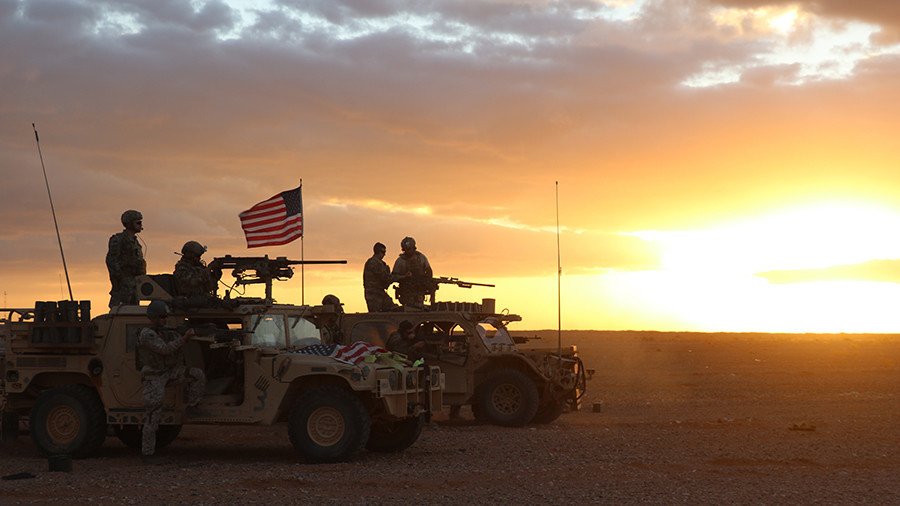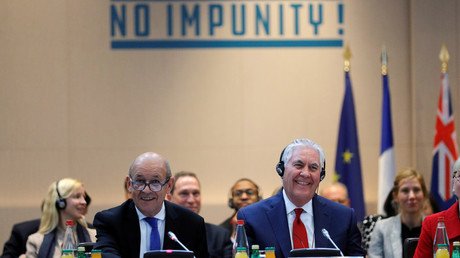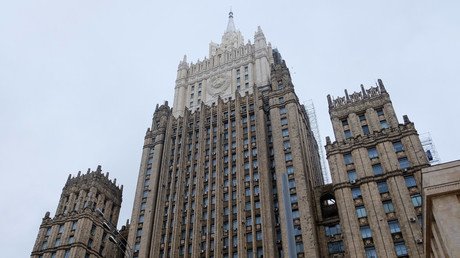US mounts its moral high horse to spin yet another ‘convenient’ chemical attack

The latest spat between Washington and Moscow over how reports of chemical weapon attacks in Syria should be investigated seems to be just an episode in which US political necessities trump transparency in policy-making.
On Monday, US Secretary of State Rex Tillerson blamed Russia for a suspected chlorine gas attack in a Damascus neighborhood. The incident was reported by anti-Damascus groups, which said the Syrian Army had attacked civilians. Tillerson used the reports to showcase Russia’s supposed bad behavior in Syria, and said “whoever conducted the attacks, Russia ultimately bears responsibility for the victims.”
The word “whoever” stands for “whichever actors in league with the President Bashar Assad regime,” since, according to Washington’s apparent reasoning, the only plausible scenario is that bad regime guys attacked innocent civilians, because why not? Alternatives, ranging from false flag operation to accidental release of the gas, which is not a chemical weapon in itself and is used in many civilian applications, were absent from Tillerson’s rhetorical exercise. This was not surprising, considering that he was speaking at an event dedicated to circumventing Russia’s veto at the UN Security Council in assigning blame for chemical attacks in Syria on Damascus.
Tillerson’s message was quite clear: since Moscow supports Damascus, whatever happens in the territory that the Syrian government claims to control is Moscow’s fault. Of course, by the same logic, US hands are covered in the blood of whoever was killed by the weapons, which the US supplied to rebels forces and which ended up in jihadist hands. But it is doubtful that Tillerson would ever publicly acknowledge responsibility for those deaths or many others that can be traced back to US foreign policy.
Russia’s response in the blame game was predictable. Brought into question was the timing of the attack – ostensibly all-to-convenient for Tillerson’s Paris speech. And the US rejection of Moscow’s proposal on how the investigation of Syrian chemical weapons reports can be continued within UN framework. And the record of Washington’s work to fit the incidents of use of toxic agents in Syria into the US-preferred narrative of “good rebels vs bad regime.”
Washington has a long record of playing this spin-game. The media offensive to sell the 2003 war in Iraq through false claims against Saddam Hussein is iconic. Saddam was accused of having weapons of mass destruction ready to attack Europe, of having ties with Al-Qaeda, and even of being behind the 2001 Anthrax attacks – all of which turned out to be false.
Later in 2011, Libya’s Muammar Gaddafi was bombed by NATO on a pretext of protecting civilians from a brutal crackdown. The scale of the crackdown was exaggerated by Western officials and uncritical media outlets, while fallout from the intervention was and remains catastrophic. The noble rebels might have publicly executed their enemies in squares and put black people in cages, but they still were the good guys.
And earlier in 1964, the US manipulated the public view of the Gulf of Tonkin incident to go to war in Vietnam, while failing to report its actual policies in the region and its role in fanning up the hostilities. Back then it was a major scandal.
Daniel Ellsberg, the whistleblower who exposed this, lamented in 2001, after the full version of the so-called Pentagon papers was declassified, that the public was unlikely to get a similar disclosure of how Washington actually sees its role in the greater Middle East. “What we need released this month are the Pentagon Papers of Iraq and Afghanistan (and Pakistan, Yemen and Libya). We're not likely to get them; they probably don't yet exist, at least in the useful form of the earlier ones,” he wrote at the time.
It’s 2018 now, and the US is showing great consistency in following the same script. Of course, Washington and its allies are morally obliged to punish evil dictator Bashar Assad and his evil puppet master Vladimir Putin for war crimes in Syria. Ride your high horse!
















